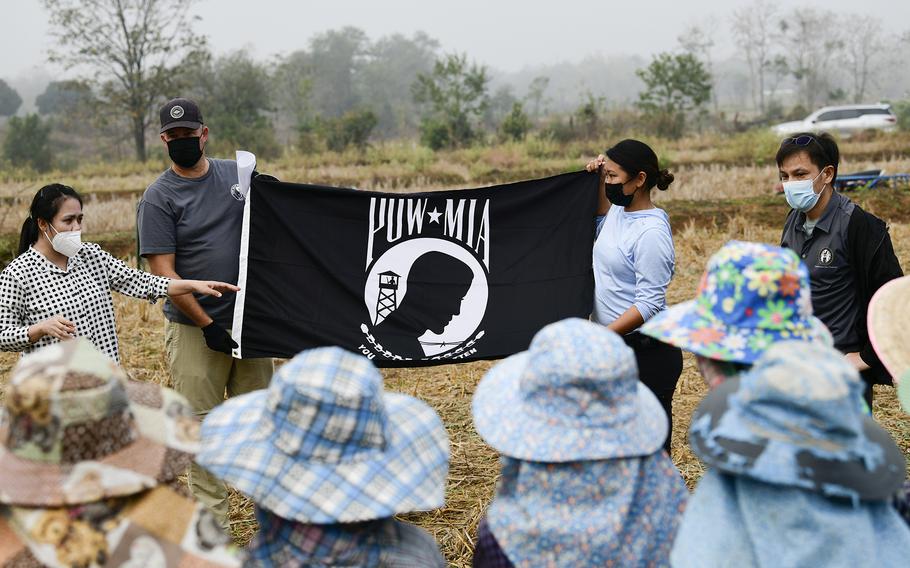
Defense POW/MIA Accounting Agency staffers talk about the National League of POW/MIA Families’ flag with Thai workers during an excavation in Lampang province, Thailand, on Feb.16, 2022. (Michael O'Neal/U.S. Army)
Families of the missing from our foreign wars are concerned that the 90-day freeze in foreign aid funding may impact efforts to clear land identified as sites designated for investigation by the Defense POW/MIA Accounting Agency. I am an advocate for the family of Joseph Matejov, one of the “backenders” lost in the shootdown of the Baron 52 intelligence flight in southern Laos in February 1973. My father was a member of the pilot squadron and a victim of Agent Orange exposure illness due to his service.
This case, investigated and reported on earlier this month by The War Horse, showcases remaining questions and the hope that at some point an investigative team will revisit the site to explore areas not previously excavated by DPAA.
The crash site is located in Laos’ Saravan province, one of the most heavily littered areas with remaining unexploded bombs dropped by the U.S. during the secret war in Laos. DPAA needs the land they investigate to be cleared of these threats before they can do their important work sifting through the soil for remains. This would require clearing by professional demining organizations, most of which are supported by U.S. funding. This vital work is currently on hold due to the funding freeze.
At least 2.5 million tons of ordnance, including 270 million cluster bombs, were dropped on Laos during 580,000 bombing sorties. That equals roughly a planeload every eight minutes for nine years, most of which was executed during the Nixon administration, including years of bombing directed by Secretary of State Henry Kissinger in nearby Cambodia.
Approximately one-third, or 80 million, did not explode on impact. Despite decades of coordinated efforts, only about 10% of the unexploded ordnance (UXO) has been successfully removed. A majority of those killed or injured by UXO are children. Nearly 52 years after the war, Laos still has a significant problem, and it goes even deeper than casualty statistics. Currently, there are an average of 15 casualties a day worldwide from the explosive remnants of war — about half of which are children.
These clearance efforts are critical to saving lives. In 2023 alone, U.S. funded programs cleared over 47,000 acres of land and provided medical and rehabilitative care to over 71,000 survivors of explosive remnants of war.
Knowing the pain MIA families still face, decades later, yearning for answers about the whereabouts of their loved ones, they deserve for this work to continue. It needs to continue not just in Southeast Asia but in war-torn regions around the world. Additionally, those who reside in their native country, which was decimated by another country, deserve for those legacies of war to be restored to prevent further pain and suffering to the innocent victims spanning multiple generations.
The time is now. We can’t deny the damage our country did and should have resolved decades ago in countries such as Laos, Vietnam and Cambodia.
This year marks the 30th anniversary of the normalization of U.S.-Vietnam relations and the 40th anniversary of the U.S.-Laos collaboration on recovering MIA personnel. The U.S. partnership with Laos, Cambodia and Vietnam has helped make great strides on important issues such as clearance of explosive remnants of war, dioxin remediation, and the search for missing-in-action personnel.
Foreign aid funding must remain in place to continue these important life-saving, casualty-prevention efforts that also help our government locate and bring home our missing service members from war. When foreign aid is suspended, the consequences are devastating, not just for the people who depend on it, but for the U.S. as well. A waiver or quick and affirmative review for mine clearance and victim assistance programs is urgently needed to allow clearance professionals to get back to work to protect and support those impacted in-country by UXO and dioxin effects, and allow DPAA to do important work to bring our missing service members’ remains home to their proper resting place.
Heather Moore Atherton, a communication professional and daughter of a Vietnam War veteran, is an emeritus board member of Legacies of War.